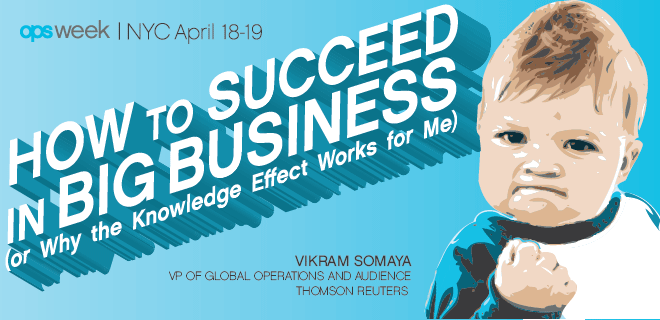
For the first 14 years of my career, my idea of a large company was 200, perhaps 300 people. My personal sense of scale took a whipping when I decided to go to work at the consumer division of Thomson Reuters, a company that employs 60,000 souls.
I walked in with 12 years of tightly muscled startup experience, company sizes ranging from 10 to the afore-mentioned 300. I believe I had worked with some of the smartest, most innovative, forward-thinking people in our industry, but I did come on board with certain preconceptions about working at a publisher and a sprawling, multinational organization. Some turned out to be true, others not so much.
Belief 1
My first belief was that a large company could not possibly be as maniacally self-aware of its own weaknesses as the average startup. In this, I was not entirely wrong, but I certainly was not entirely right either.
The Truth 1
As with every accomplished publisher, the good people at the Consumer Media division of Thomson Reuters were rightfully proud of having created a strong and compelling editorial voice wrapped in the subtle leather of a well-designed commercial skein. However, while they knew they wanted to work with data and programmatic buying, their knowledge of these arcane sciences was limited.
Given its rapid and sudden genesis deep within the heart of the ad-tech complex, this was entirely understandable. They knew enough to know they didn’t know enough and took steps to address that and to my mind while slightly late to the party, that was a sign of signal self-awareness.
Belief 2
One of the most compelling attributes of working at Thomson Reuters for a data wonk is the fact that it is a company that has built its fortune on the creation, curation and distribution of data. Not advertising data in the large but name your poison where others kinds are concerned – legal, financial, scientific, market… The list goes on and on. I desperately wanted to be able to access that trove and find a way to maximize its value for the consumer data world. I thought this would find ennui in response.
The Truth 2
Not only were other divisions more than open to the idea of unifying, exploring and utilizing their data appropriately but also most of them were champing at the bit at the thought of the business applications that would emerge as a result.
I quickly found myself struggling to build our customer intelligence infrastructure fast enough to accommodate the growing legions of groups and forward-thinking business analysts looking to us to mine data that would validate hypotheses and triangulate known and prospect audiences. This went far beyond my initial remit to explore audience data for advertising purposes alone and yet made eminent sense to anyone looking to address the promise of Big Data at enterprise scale.
Belief 3
I came in a believer in the incredible vitality and innovation of the ad technology community. I thought most any large company would be loath to build a stack that utilized all that accessible yet external power and flexibility and it would be an uphill battle to create a culture that would bring in the best parts of the startup technology race while preserving the ethos and culture of Reuters.com.
The Truth 3
I was right in some ways. Working with procurement and budgeting at a large company is no picnic and yet in eight months, we talked, listen-pitched and discussed technology with close to seventy ad technology firms. Many of them got to walk the gauntlet of the aforementioned procurement and legal teams and we are in the process of building an analytics and intelligent decisioning stack that I would put up against any premium publisher in the world combining both internal and external technology stacks.
My teams and those I worked with through the organization embraced innovation and acceleration with fierce alacrity and some of them I would put up into the hall of ad technology performance fame. Every day now, they humble me with their integrity, sense of purpose and dedication to the work we do together.
The Knowledge Effect
These are but some of the lessons I have learned in my time at Thomson Reuters so far. However, on the whole I have been surprised and energized at how much of the ad tech rat terrier tenacity and purpose I found in this enterprise and those like it with whom I now partner.
TR’s tag line is one I rather love – “The Knowledge Effect.” It maintains that to perform, the business professional world needs data tamed – knowledge to power that ongoing productivity. In that respect, the stack we were building was just another expression of that fundamental purpose.
I am both elated and invigorated by the fact that innovation and drive can live anywhere, it’s the people that allow it to be, not the size or nature of its encompassing framework.
 |
Hear more about building a DMP from Vikram Somaya, Vice President of Global Operations and Audience for Thomson Reuters, at OPS Markets, which will bring digital advertising leaders and ops professionals together to discuss and develop best practices for operational excellence in the evolving automated landscape. Register today for OPS Markets, which will be held April 18, 2012, in New York. |